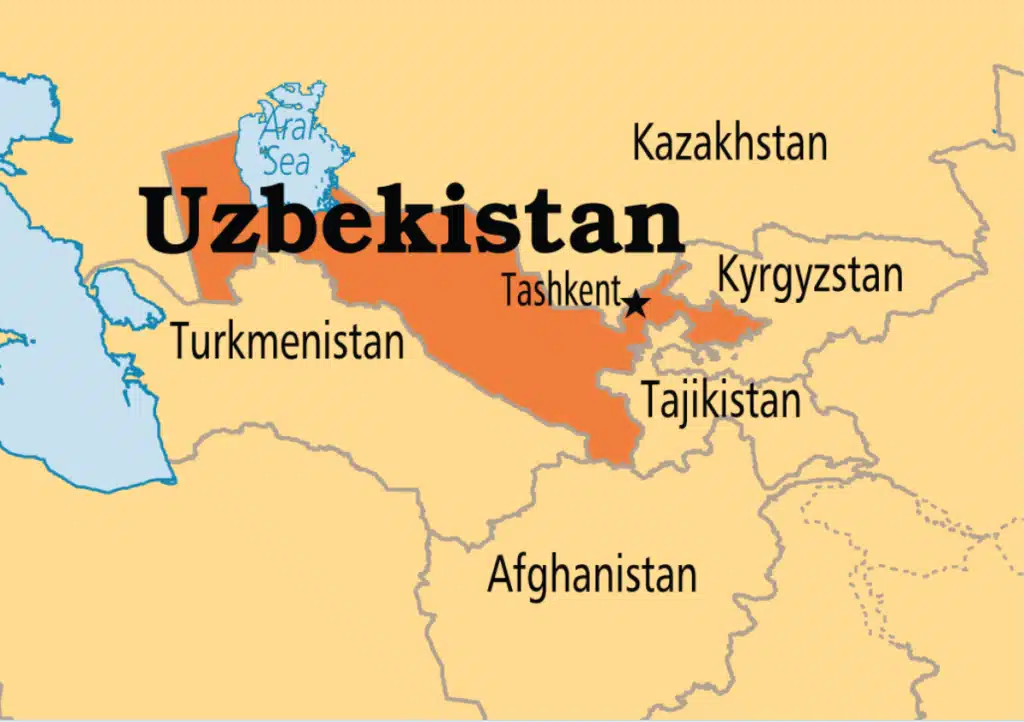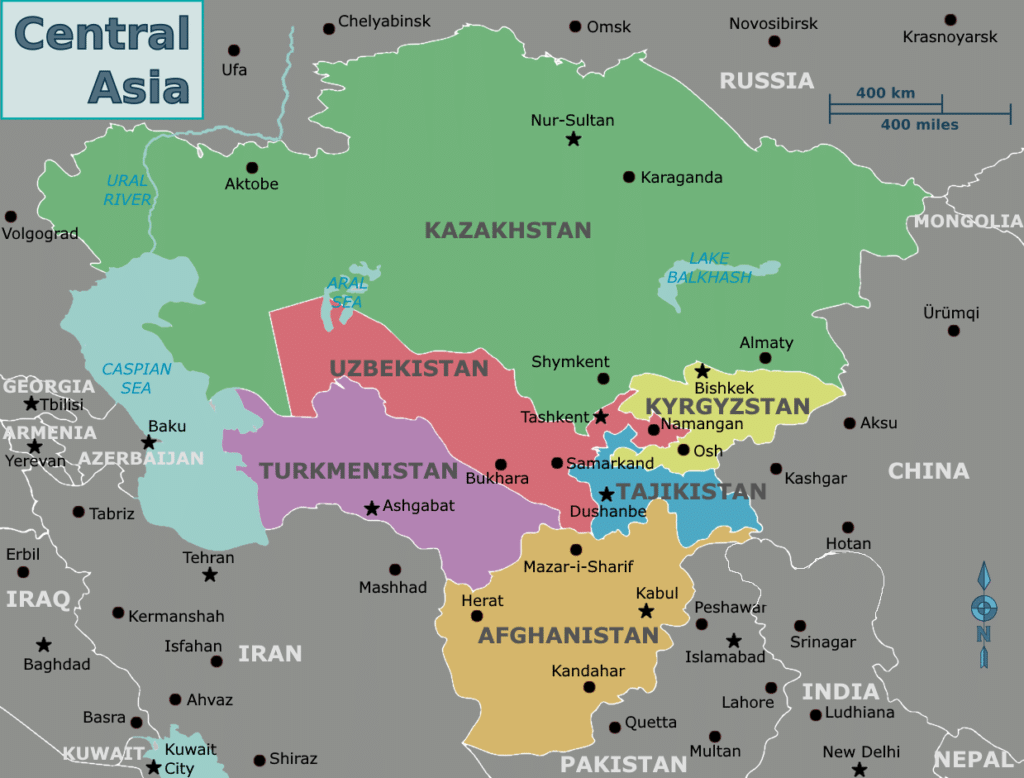Uzbekistan is one of the central Asian countries with Tashkent as its capital, bordering Aral Sea. The territory of Uzbekistan is a peculiar combination of plains and mountain terrain. India’s relation with the country has been cordial and holds great potential in various areas beneficial to both the countries.
Historical Background
India and Uzbekistan have shared much in common historically such as:
- There are frequent mentions of parts of present day Uzbekistan in the Pali and Sanskrit literature with the name of Kamboja.
- Ancient trade route Uttarpath passed through Uzbekistan covering Fergana, Samarkand, Bukhara in Uzbekistan.
- Buddhism is said to have travelled to China through Uzbekistan and Central Asia.
- There has been close cultural linkage between the two countries. For example Mirza Ghalib and Amir Khusro are notable Indians of Uzbek parentage.

Areas of Cooperation
Political
- India had close relations with Uzbekistan during the soviet times when the country was the part of the USSR.
- Indian leaders often visited Tashkent and other places. Former Prime Minister, Lai Bahadur Shastri passed away in Tashkent on 11 July 1966 after signing the Tashkent declaration with Pakistan. Other high level delegations from India to travel Uzbekistan after the independence of Uzbekistan from USSR include former PMs P.V. Narasimha Rao and Manmohan Singh in 1993 and 2006 respectively.
- The most recent visit was that of Prime Minister Narendra Modi, where several agreements and MoU were signed in the area of economic ties, counter terrorism and many more.
- President of the Republic of Uzbekistan H.E. Mr. Shavkat Mirziyoyev paid a State visit to India on 30 September-1 October 2018. India and Uzbekistan exchanged 17 memorandum of understanding (MoUs) in an effort at opening a new chapter in relations in various sectors.
Economic
- Trade relations between India and Uzbekistan are governed by the Agreement on Trade and Economic Cooperation signed in May 1993. This agreement provides for such things as mutual MFN treatment, promotion of economic, industrial, scientific and technical cooperation, including active participation of small and medium sized enterprises in bilateral economic cooperation, and countertrade, etc.
- India and Uzbekistan also signed an Agreement on Avoidance of Double Taxation in 1993 and for Bilateral Investment Promotion and Protection in May 1999.
- Trade has increased from USD 247 million in 2019-20 to USD 342 million in 2021-22, a growth of 38.5%.
- Business relationships between the two countries will be promoted through the India-Uzbekistan Business Council, for which an agreement was signed in October 2018. Both sides agreed to constitute an expert group between India and Uzbekistan to conduct Joint Feasibility Study and commence negotiations for India-Uzbekistan Preferential Trade Agreement by the end of 2018.
- According to a pact signed in 2014, Uzbekistan has signed for supply of 2000 metric tonnes of Uranium over the next four years (2014-2018). Also, during the visit of Prime Minister Narendra Modi, an understanding was reached on a wide range of issues to further deepen Uzbekistan-lndia strategic relations, mutually beneficial bilateral cooperation in various fields, as well as international and regional issues of mutual interest.
Investments
- Indian investments by Indian companies include those in the field of pharmaceuticals, amusement parks, automobile components, and the hospitality industry.
- Amity University and Sharda University have opened campuses in Tashkent and Andijan respectively.
- Indian institutions like iCreate are actively cooperating with Uzbek counterparts for promoting a start-up ecosystem in Uzbekistan and training entrepreneurs in setting up incubators.
Defense
- The first-ever joint military exercise held between India and Uzbekistan was named Dustlik.
- India has also assisted in setting up an India Room at the Armed Forces Academy of Uzbekistan in Tashkent.
Security
- India and Uzbekistan share common perspectives on a number of security issues, including terrorism, trans-national organized crime, illegal trafficking, smuggling, etc.
- The main focus of engagement in this sphere has been to provide assistance to Uzbek security agencies through training and capacity building.
Cultural
- An institution named Lai Bahadur Shastri Centre for Indian Culture working under Indian Council for Cultural Relations (ICCR), was established in Tashkent in 1995 , where several cultural activities are carried on.
- There are three Uzbek educational institutions nationwide in Uzbekistan that promote studies of Hindi language, from primary to post-graduate level.
- Direct flights between Tashkent and Mumbai have been introduced strengthening people-to-people contact.
Tourism
- The Uzbek government has extended the e-Visa facility to Indian tourists.
- Uzbekistan has also emerged as a significant source of medical tourism with about 8,000 Uzbeks annually seeking medical treatment in India.
Solar Power
- Uzbekistan has expressed interest in joining the International Solar Alliance.
- There is interest in Indian participation in the development of the solar power sector through competitive bidding.
Significance of Uzbekistan to India
- Uzbekistan is an Uranium rich country which can help India in sustaining its nuclear power plant and help achieve its electrification targets.
- Being an energy rich country, it can help India in decreasing its dependency on one particular country to meet its energy requirements.
- Uzbekistan is a prosperous destination for investment in areas of infrastructure for better regional connectivity which can help India to increase it trade exports. For this, India has shown its strong interest in Ashgabat Agreement which is a transit pact established in 2011 between Uzbekistan, Iran, Turkmenistan and Oman.
- Uzbekistan has supported India’s membership of the Ashgabat Agreement. Following this, India has joined the agreement on 2nd February, 2018.
- A good relation between the two countries will help India in getting support at various international organisations like SCO and United Nations. It may also help India in getting support for permanent seat in United Nations.
Significance of India to Uzbekistan
- India is the largest democracy and emerging power in the world. Uzbekistan needs India’s cooperation in ensuring stability and development of the country.
- Investment by India in Uzbekistan can help develop its Special Economic Zone framework of ‘Navoi’, ‘Angren’ and ‘Jizzakh ‘.
- Service sector of India, particularly the IT sector, can help Uzbekistan to boost its service sector.
- India is one of the major producer of generic drugs. Hence, it can help Uzbekistan in developing its pharmaceutical industry and help in ending many life threatening diseases.
Challenges in Relations
- Despite considerable potential, the level of actual trade and investment between the two countries has been very low.
- Lack of connectivity, as Uzbekistan is a landlocked country, and the air connectivity is not up to the mark.
- The spread of fundamentalism and ISIS pose challenges to India’s strategic interest in the region.
- China has made in-roads with Belt and Road Initiative in all the central Asian countries including Uzbekistan.
Future Prospects
- The two sides should expand and further strengthen long-term bilateral cooperation covering diverse sectors such as political ties , security including cyber security, counter-terrorism, trade and investment, science and technology as well as cultural linkages. Uzbekistan should be encouraged to join the International North South Transport Corridor.
Way Forward
- Indian companies can take advantage of Uzbekistan’s various trade agreements and implement joint beneficial investment projects in the area to tap the economic and trade potential of the two countries.
- There is a need for increased convergence between the two countries.
- Uzbekistan should join the International North-South Transport Corridor (INSTC). With both Iran and India as members of INSTC, the addition of Uzbekistan will move things, especially connectivity, in the proper direction.

